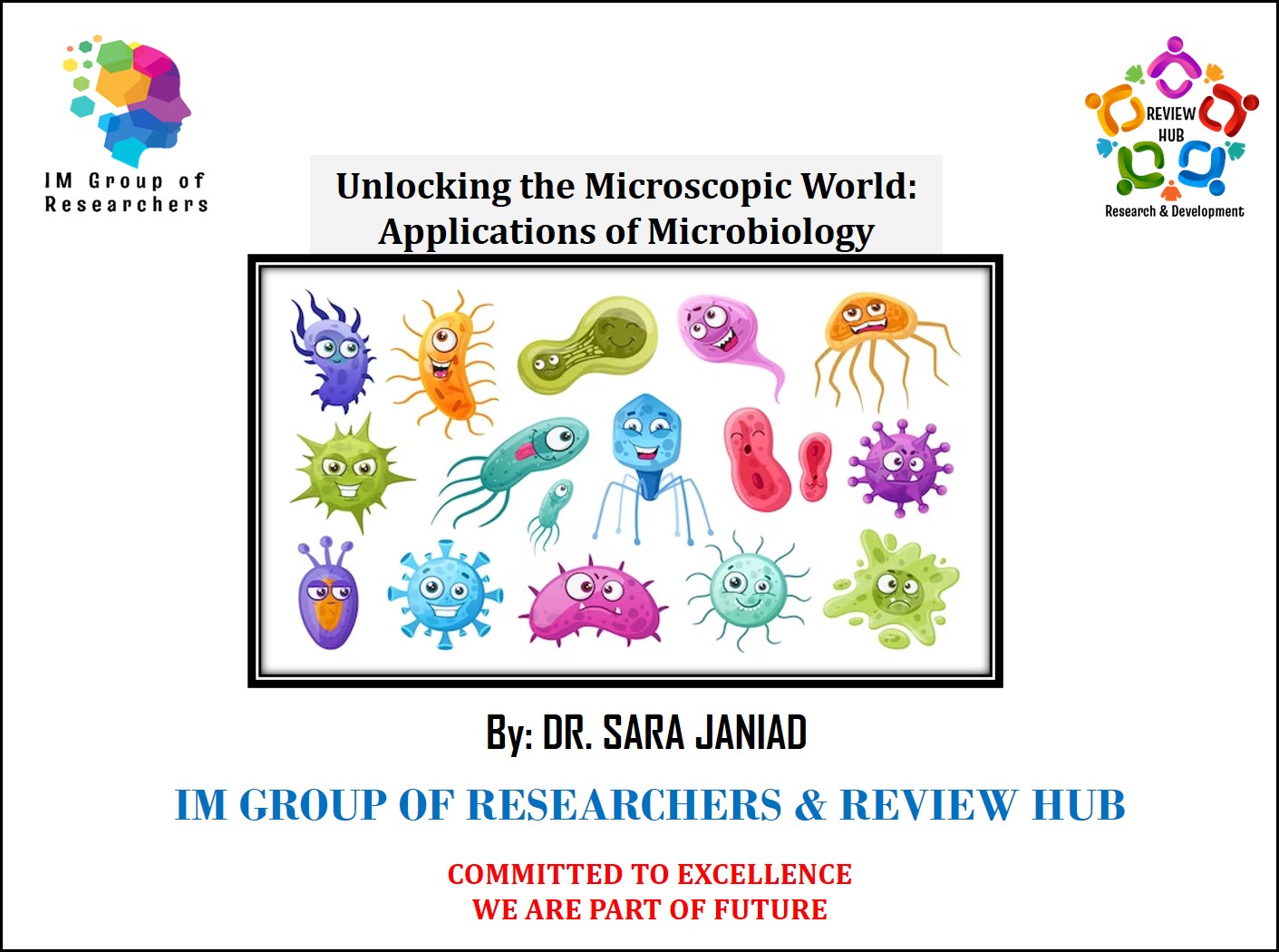Unlocking the Microscopic World: Applications of Microbiology
Microbiology, the study of microorganisms, has revolutionized our understanding of life on Earth. From deciphering the intricacies of microbial ecosystems to developing life-saving vaccines, the applications of microbiology are vast and continually evolving. In this blog, we will explore the diverse and critical applications of microbiology in various fields, ranging from healthcare to environmental science. So, here is how we are Unlocking the Microscopic World: Applications of Microbiology.
Authors:
Dr. Sara Janiad

LinkedIn: Click here to see Dr. Sara’s profile
1. Healthcare:
a. Infectious Disease Diagnosis and Treatment:
Microbiology plays a pivotal role in identifying and combatting infectious diseases. Clinical microbiologists use techniques like culturing, polymerase chain reaction (PCR), and genetic sequencing to detect pathogens such as bacteria, viruses, and fungi. This information is essential for diagnosing infections and selecting appropriate treatments.
b. Vaccine Development:
The development of vaccines against infectious diseases relies heavily on microbiological research. Vaccines are created by attenuating or inactivating disease-causing microorganisms, stimulating the immune system to produce protective antibodies.
c. Antibiotic Production:
Microorganisms are a source of many antibiotics. Researchers in microbiology study microbial strains to discover and develop new antibiotics, addressing antibiotic resistance, a global health concern.
2. Food and Beverage Industry:
a. Fermentation:
Microorganisms like yeast and bacteria are used in the food industry to ferment products, producing foods such as bread, cheese, yogurt, and alcoholic beverages. Microbiologists optimize fermentation processes to ensure product quality and safety.
b. Food Safety:
Microbiologists monitor and ensure food safety by detecting harmful microorganisms like Salmonella and E. coli. This prevents outbreaks of foodborne illnesses and ensures the quality of food products.
3. Environmental Science:
a. Bioremediation:
Microbiology plays a vital role in cleaning up polluted environments. Certain microorganisms can break down or detoxify contaminants in soil and water, making bioremediation an eco-friendly solution for environmental restoration.
b. Wastewater Treatment:
Microbes are instrumental in wastewater treatment plants. They help break down organic matter, purify water, and remove harmful pathogens, ensuring the safety of our water supply.
4. Pharmaceutical Industry:
a. Drug Production:
Microorganisms like bacteria and yeast are used to produce a variety of pharmaceuticals, including insulin, hormones, and enzymes. Genetic engineering techniques have further enhanced their productivity.
b. Drug Testing:
Microbiology is involved in the testing and quality control of pharmaceutical products. Ensuring the sterility and safety of drugs is a crucial part of the industry.
5. Biotechnology:
a. Genetic Engineering:
Microbiology is at the heart of genetic engineering and biotechnology. Scientists manipulate the DNA of microorganisms to produce biofuels, pharmaceuticals, and genetically modified organisms (GMOs) with improved traits.
b. Biopharmaceuticals:
Microbes are used to produce biopharmaceuticals such as insulin and vaccines through recombinant DNA technology.
6. Agriculture:
a. Crop Protection:
Microbiology is employed to develop biopesticides and biofungicides that are environmentally friendly alternatives to chemical pesticides.
b. Soil Health:
Microbes in soil contribute to nutrient cycling and plant health. Microbiologists study soil microbiomes to improve crop yields and sustainable farming practices.
Conclusion
Microbiology has permeated every facet of our lives, contributing to advancements in health, food safety, environmental protection, and technological innovation. As our understanding of microorganisms deepens and technology continues to advance, the applications of microbiology will only expand, shaping a healthier, more sustainable future for our planet and its inhabitants. It is a testament to the power of the microscopic world and the potential it holds for the benefit of humankind.
Follow us on Facebook – Click Below

